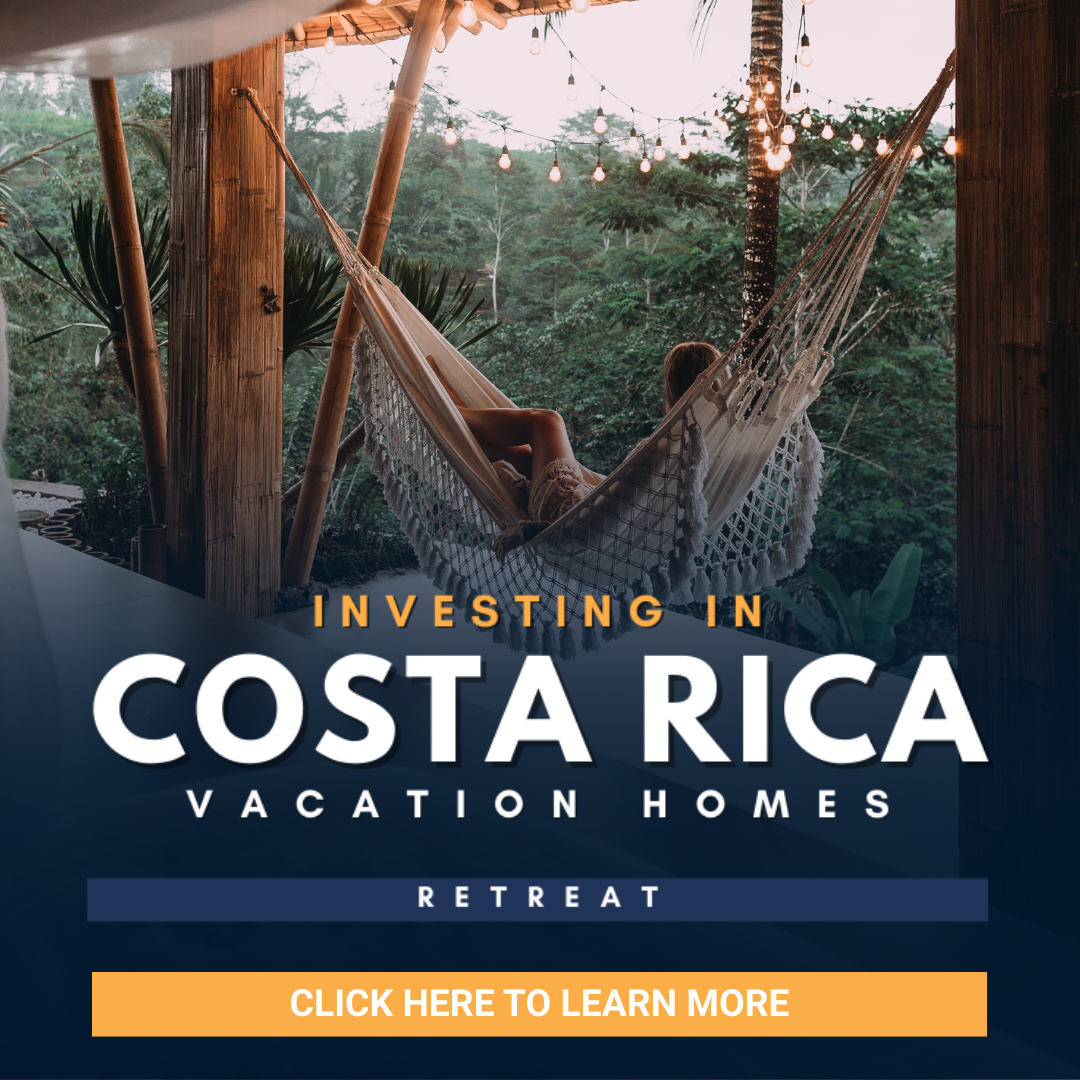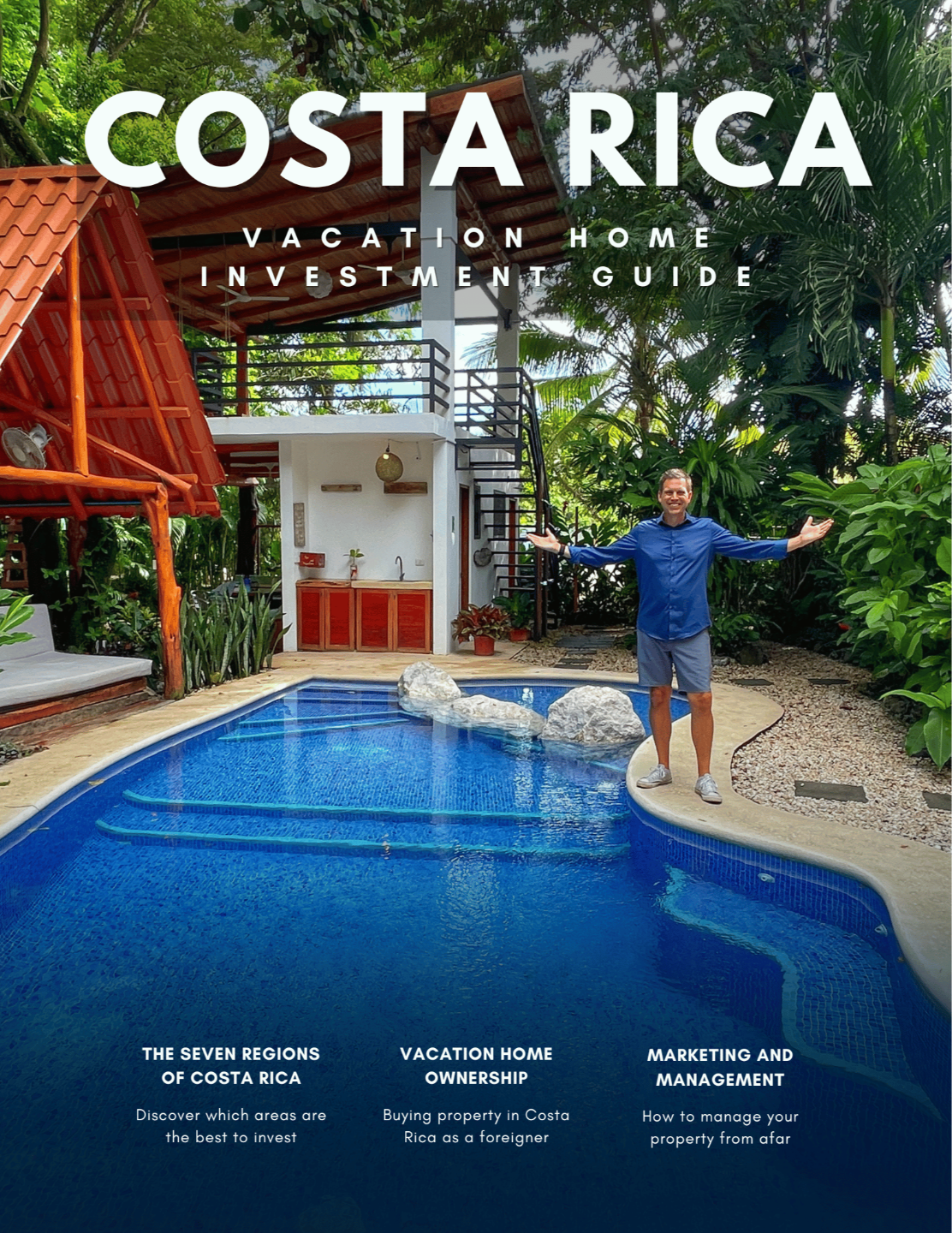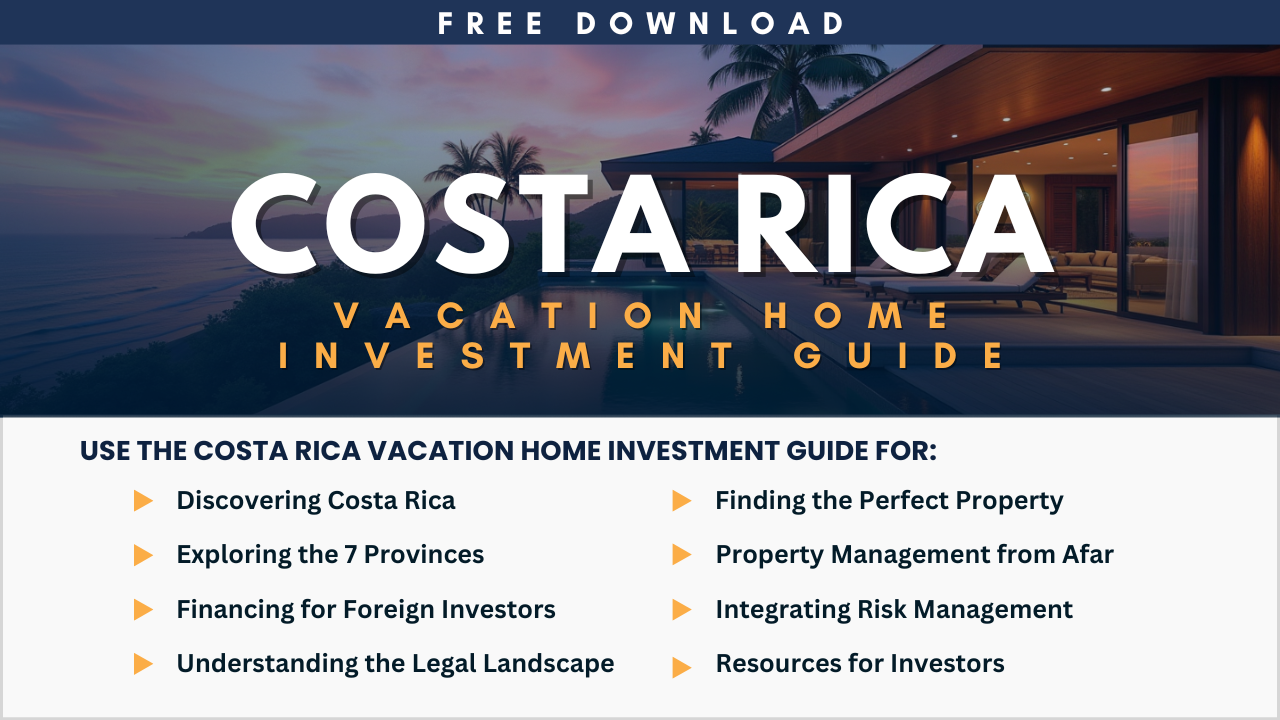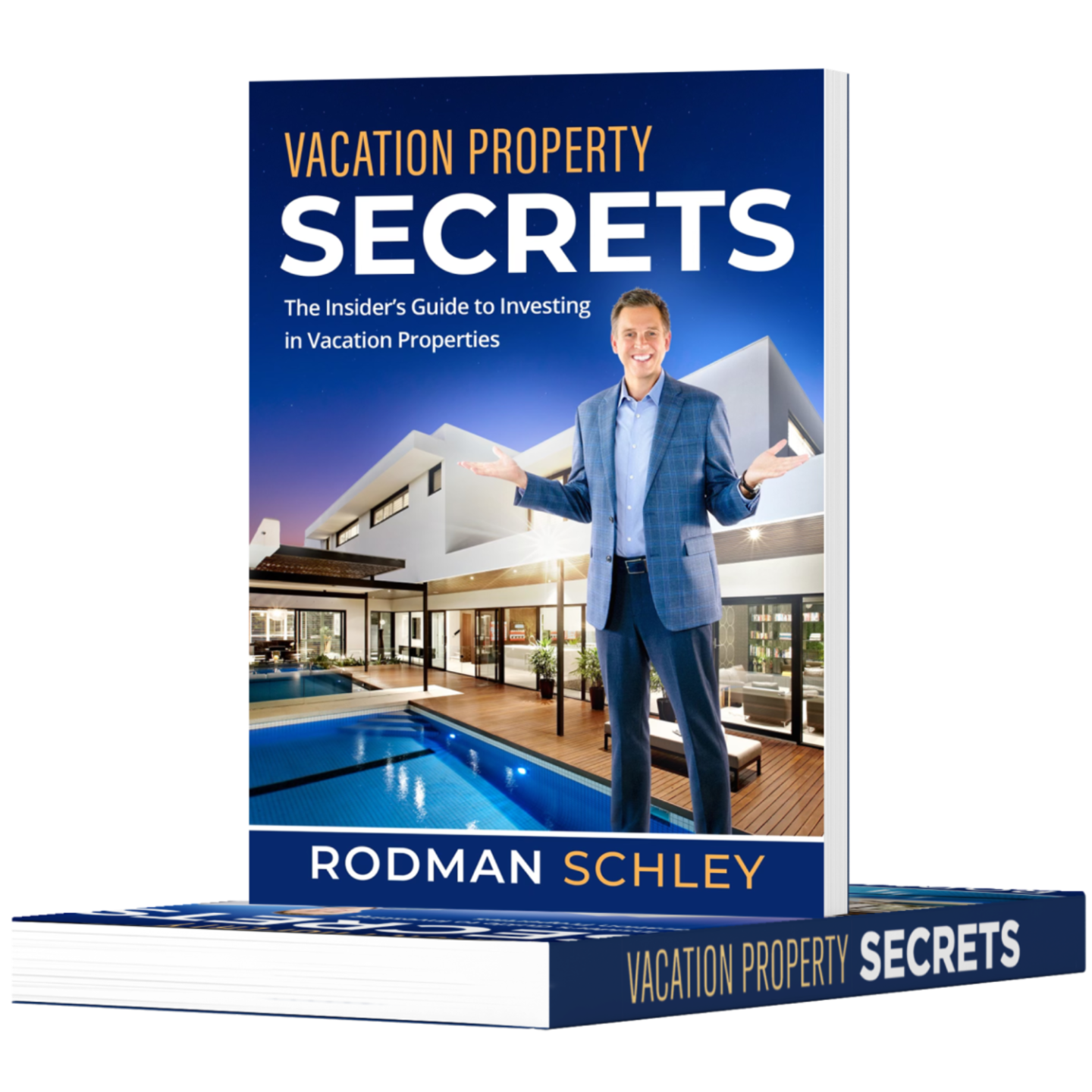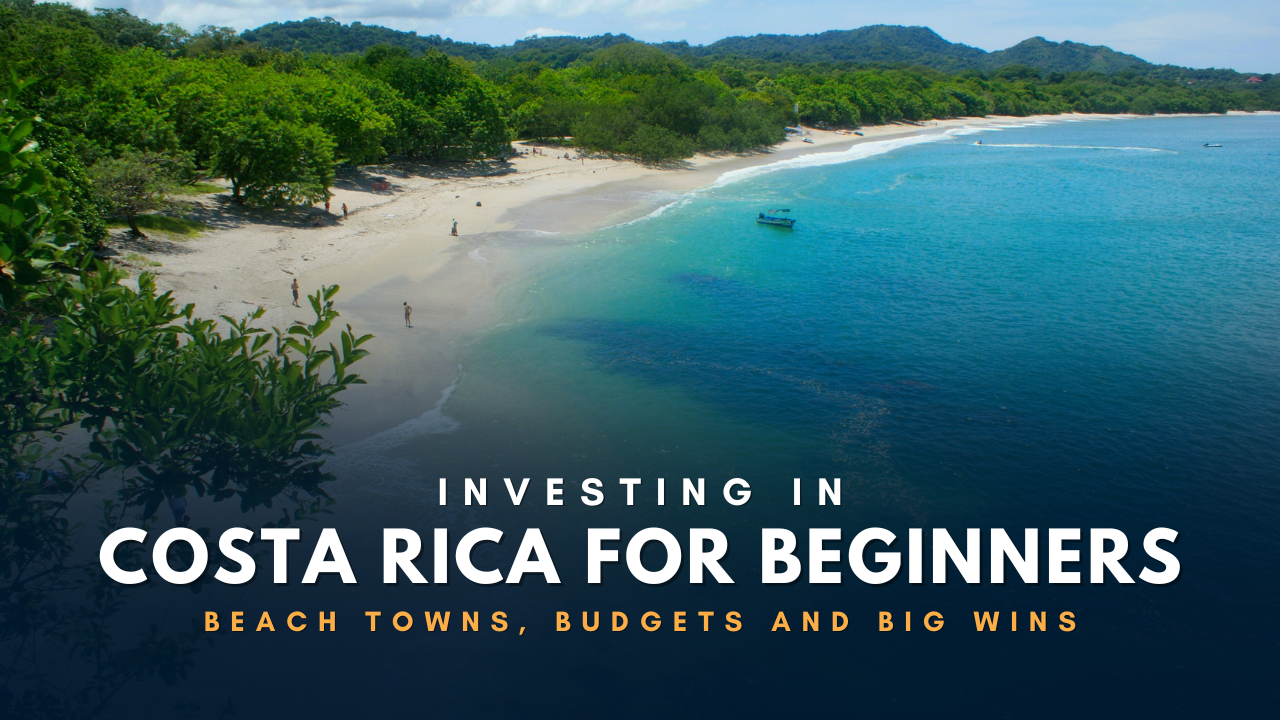
Investing in Costa Rica for Beginners: Beach Towns, Budgets, and Big Wins
When I first dreamed of owning a place in Costa Rica, I wasn’t thinking like an investor. I was thinking like someone desperate for more sunshine and a slower pace of life. Winters in Colorado had become long and uninspiring, and every time I looked out the window at gray skies and icy roads, I found myself daydreaming about warm sand, palm trees, and the rhythmic crash of waves.
But daydreams don’t pay the bills—and I’ve always been someone who needs my decisions to pencil out. So, before I ever stepped foot into a beach town, I started researching. What I discovered surprised me: Costa Rica isn’t just a paradise for vacationers—it’s a smart, strategic market for real estate investors who know where to look and how to play it right.
In this post, I want to walk you through what I’ve learned—specifically for beginners. If you’re thinking about buying your first vacation home in Costa Rica, let this be your guide to the towns, the numbers, and the wins that matter most.
The Allure of a Different Kind of Investment
Most people don’t start their Costa Rica search with spreadsheets and pro formas. They start with a feeling—an image of a hammock swinging under the trees, or a family surf lesson that ends in laughter and sunsets. That’s the beauty of this country: It stirs something emotional.
But the truth is, what makes Costa Rica so emotionally appealing also makes it financially smart.
Unlike many resort destinations, Costa Rica has real, long-term staying power. It’s politically stable, environmentally forward-thinking, and extremely welcoming to foreigners. Tourism is a major part of the economy, and short-term rental laws are well-established and investor-friendly. You don’t need to be a resident to own property here, and in most areas, foreigners have the same rights as locals.
That’s rare. And that’s where opportunity begins.
Where to Invest: Beach Towns That Balance Beauty and ROI
Every investor wants to know: Where’s the best place to buy? The truth is, it depends on your goals. Do you want pure rental income? A mix of personal use and cash flow? A long-term appreciation play?
Let me tell you about a few towns I’ve explored firsthand—each with their own personality, pace, and investment potential.
Tamarindo was the first beach town I visited with investment goggles on. It’s vibrant, bustling, and full of restaurants, surf schools, and nightlife. Tamarindo isn’t cheap, but it’s incredibly popular with tourists, which makes short-term rental income strong and reliable. Think of it as the Playa del Carmen of Costa Rica: high visibility, high occupancy, and a well-oiled infrastructure to support tourism.
Then I found Samara—a quieter, more family-oriented town with horses on the beach and yoga studios tucked into the jungle. It didn’t have the buzz of Tamarindo, but what it had felt more grounded. Samara attracts travelers who stay longer and spend with purpose. And while the market is still emerging, the appreciation potential is real. I saw properties in Samara priced 30–40% below similar ones in more developed towns.
I also visited Santa Teresa, a hip, high-end surf town where barefoot influencers sip smoothies and property prices rival Malibu. It’s not for every investor, but if you’re playing at the luxury level, Santa Teresa delivers. Ocean-view villas with plunge pools rent for thousands a week. The demand is strong—especially with the digital nomad crowd—and the town’s exclusivity gives it resilience.
And then there’s the Southern Zone—places like Dominical and Uvita. This area is lush, green, and dramatic in topography. It feels wilder. Properties here tend to sit on hillsides with sweeping views, and the vibe caters more to eco-tourists and nature lovers. It's a slower play, but with serious upside for appreciation.
Each of these places is worth visiting. Better yet, stay in a rental, walk the streets, and talk to people. Boots-on-the-ground research is the best kind—and in Costa Rica, it comes with a coconut in hand.
Understanding the Numbers: What Does It Cost?
Let’s get honest about the budget.
In many parts of Costa Rica, you can still find entry-level condos near the beach starting around $150,000 to $250,000. These might be studio or one-bedroom units—ideal for solo travelers or couples and very manageable for first-time investors.
Step up to single-family homes with rental appeal, and you’re looking at the $300,000 to $600,000 range. These are 2–3 bedroom homes with pools, walkability to the beach or town, and space for families or groups.
If you're after luxury villas or ocean-view estates, expect prices from $700,000 and up—sometimes well into the seven figures.
But that’s just the purchase price.
You'll also want to budget for:
-
Legal fees (around 1.25% to 1.5% of the sale price)
-
Closing costs and taxes (another 2.5% to 3.5%)
-
Corporate setup fees if you’re buying through an entity (which many investors do)
-
Ongoing property taxes (a surprisingly low 0.25% annually)
-
HOA fees, insurance, and maintenance
-
And for luxury homes: a "solidarity tax" if your construction value exceeds a set threshold
The takeaway? Costa Rica can meet a variety of budgets—but you need to understand the full cost of ownership to make a smart decision.
Can You Actually Make Money?
Yes—and many people do.
But it’s not automatic.
The vacation rental market in Costa Rica is strong, but it’s also seasonal. High season (December through April) can bring in incredible returns, while low season (especially during rainy months) might be quieter than expected. I always recommend building your income projections around 60% to 70% occupancy, not 100%. That way, any upside is a bonus, not a lifeline.
Your average daily rate (ADR) will depend on your location, amenities, and property type. Homes with pools, A/C, Wi-Fi, and a short walk to town tend to command higher nightly rates. That said, even simple homes in the right location can be profitable.
If you’re not planning to live in Costa Rica full time, you’ll also want to factor in property management. Most local managers charge 20% to 30% of gross rental income. That might sound steep—but a good manager will keep your calendar full, your guests happy, and your property maintained.
Remember: this is a business. And like any business, the numbers have to work.
The One Thing Most Beginners Overlook
It’s not the taxes.
It’s not the property.
It’s the team.
When I bought my first property in Costa Rica, I made the rookie mistake of thinking I could handle most of it myself. I was experienced in real estate. I’d run the numbers. I’d done international deals before. But what I didn’t realize is how different the systems are here—and how much trust matters.
I quickly learned that I needed:
-
A real estate attorney who could verify title and land use
-
A broker who understood investment fundamentals, not just beachfront fantasy
-
A property manager who knew how to fill a calendar and handle emergencies
-
A contractor who could build or renovate with quality and integrity
-
And a tax advisor who understood the rules for foreigners
When you assemble the right team, everything changes. You avoid costly mistakes, and you make decisions with clarity. You feel like an insider—not just a tourist with a checkbook.
Why I Love This Market (And Why I Teach It)
Today, I live part of the year in Costa Rica. I run retreats. I teach classes. I walk the same beaches I used to only visit in my mind.
And I don’t just love it because of the sunsets and smoothies.
I love it because the numbers work.
Real estate here has appreciated steadily. The rental market remains strong. And most importantly, the quality of life is unmatched.
But I also know how easy it is to get it wrong. I’ve seen buyers purchase properties with no title, buy in the wrong zone, or assume rental income would roll in without a plan. That’s why I built an entire platform to help investors avoid the mistakes I almost made—and step into this opportunity with both inspiration and intelligence.
Final Thoughts: Big Wins Require Smart Starts
If you're just beginning your Costa Rica journey, here’s what I’d say:
-
Don’t chase hype—chase fundamentals.
-
Visit before you buy.
-
Think like both a lifestyle enthusiast and an investor.
-
And most of all—don’t go it alone.
Costa Rica isn’t just a vacation—it’s an investment in the life you want to build.
And when you invest wisely here, the wins aren’t just financial. They’re personal.
They’re mornings spent drinking coffee with ocean views. Afternoons spent exploring waterfalls. Evenings where your inbox says “booking confirmed” while you're walking the beach barefoot.
That’s the magic. And it’s waiting.
Ready to Invest with Confidence?
If you're serious about buying a vacation home in Costa Rica—but want to avoid the costly mistakes most new investors make—my online class is the perfect next step.
Inside the Investing in Costa Rica Vacation Homes course, you'll get:
- Step-by-step guidance from a real estate valuation expert
- Legal, financial, and tax fundamentals tailored for foreign buyers
- Tools to build your pro forma and estimate ROI like a professional
- Real-world examples, guest interviews, and exclusive checklists
- Access to a powerful investor community for support and strategy
This isn’t another hype-filled webinar. It’s a proven system built to help you invest smarter, avoid risk, and create the lifestyle you’ve been dreaming of—on solid financial fundamentals.
👉 For More Information, or to Join the VIP Waitlist now:
Click Here ----> Investing in Costa Rica Vacation Homes Class

Rodman Schley
Rodman Schley is an entrepreneur, real estate investor and valuation expert, and public speaker. He is an Emmy-nominated TV host and producer. He is the author of "The Outlier Mindset" and "Vacation Property Secrets". Currently, he leads Blue Fusion Capital, focusing on investing in short-term vacation rentals in Costa Rica. Rodman has managed and performed over $20 billion in property valuations and served on the Appraisal Institute National Board of Directors, including a term as its 2021 President.



